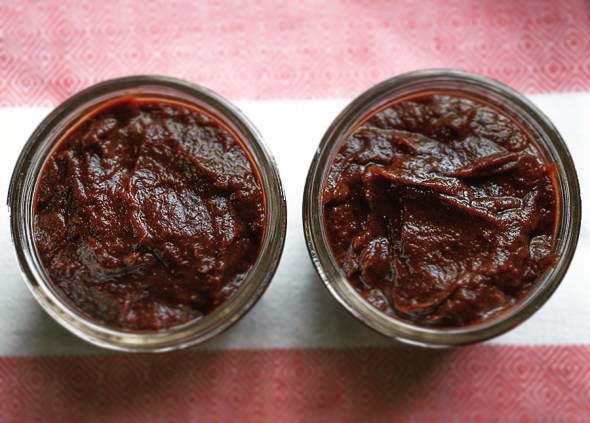
Ancho Chile Paste
Having ancho chile pepper paste is a staple in my house, with as much Mexican and Southwestern cooking that I do. I might just need a couple of teaspoons, say, to season some sour cream or mayo, or about 1/2 cup of it to add to a soup, chili, meat loaf, or enchilada sauce. I always keep jars of it frozen, to use when needed. It also keeps refrigerated for about six months.
The name of this dark red stuff comes from the fact that ancho chile peppers are used to make the ancho chile paste, which makes sense. Ancho chile peppers are actually dried poblanos. I don’t know why they can’t just call them dried poblanos, but that’s just not how it works in the chile pepper world.
The flavor of ancho chile paste, made only with ancho chiles, is dense and intense. It’s essentially reconstituted chile peppers.
But you can use other dried chile peppers, and even include hot varieties for a little zing. I personally like to use a mixture of chile peppers. Today, I’m using anchos, plus guajillos and chipotles. I’m running low on my precious chile pepper paste, so it’s time to make more. Here’s what I did:
Ancho, Guajillo, and Chipotle Chile Paste
10 ancho chile peppers (large, stubby, dark and wrinkly in the photo)
8 guajillo chile peppers (long, narrow, red and smooth)
Handful of chipotle peppers, depending on your taste (short, dark wrinkly)
Shown below, from left, ancho chile peppers, chipotle chile peppers, and guajillo chile peppers.

First you must remove the stems from all of the large dried peppers with a sharp knife, and discard. Then slice open the pepper bodies and remove the seeds.
Please be aware that even though these are not fresh chile peppers, they can still burn your skin and eyes.
Place the pepper body parts in the bottom of a large bowl.

Add boiling water to cover the peppers. Place a smaller, weighted bowl on top to keep the peppers submerged for at least one hour so they can hydrate.
Set up your blender, and have a measuring cup and a rubber spatula on hand. Using tongs, grab all the peppers you can and place them in the jar of the blender. Save the water in the bowl.
Using the measuring cup, remove some of the beautiful pepper-tinged water from the top. Seeds and any kind of debris will be at the bottom of the bowl. Add about 1/3 cup of the liquid to the blender.
Purée the peppers, adding a little more of the pepper water if necessary. The mixture should be smooth, but not too liquid.

If you have any pepper water leftover, use it in other dishes, like in a soup.
Place a sieve over a bowl. Scrape all of the ancho chile paste into the colander.
Using a spoon’s bottom, force the paste through the sieve. This process removes the chile pepper peels.

Scrape the paste from the bottom of the sieve as well, and voila! Chile pepper paste.

Place the paste in clean jars. Freeze, and thaw as needed.

Note that this recipe can be doubled or tripled, depending on much ancho chile paste you want! It’s the same amount of work!

Also note that the chile paste will stain everything – your spatula, your sink, your countertop your clothes… You will have many orange spots if you don’t catch the spills immediately!
















This is perfect, Mimi! People will be grateful to you forever for sharing this! Definitely a staple in my Southwest home!
Thank you!
I dried loads of cayenne peppers last year from the garden (I can’t get the seeds for much else.) Do you think they would work Mimi?
A cayenne chile pepper paste would be very hot! But you could still use it – just in smaller amounts!!
Thanks Mimi. I should have known really as my chilli sauce was way too hot for me!
Brilliant! What a great idea to make your own chile paste :)
It’s quite versatile and adds such great, deep flavor.
What a wonderful ingredient to make and keep…”hmmm I think I’ll put Chile paste on this…and this…and how about this?”
Cheers!
We think alike. That’s why I need to always have it around!!!
Wow, I love this! Sadly, the variety of chilies you can get in Germany is disappointing; we’ve been seeing more fresh varieties lately but no dried ones. You can’t get ancho chilies here but luckily I bought 2 packs in the UK last year, just because they were available. They might end up as paste now :-)
That’s perfect. You’ll probably get 2-3 jars from those packages. I guess I’m pretty lucky getting chile peppers locally! But I can’t get speck!
If the US weren’t so strict with food imports we could trade speck for chillies :-D
Oh that would be fun. And expensive!!!
Haha, probably not as expensive as buying a ticket to fly over (either way) just to have chillies or speck..
True! I remember the first care package to my daughter in London – jars of salsa and a bottle of Sriracha – the shipping cost more than the goods!
Thank you for posting this , I’m real sucker for homemade sauces and paste .
Anything home-made is so much better than store-bought.
Thanks for sharing this Mimi. I need to make some of this. I didn’t realize the shelf life was so long. Yay!
Oh yeah. Not that it lasts very long when I have thawed a jar, but it doesn’t mold. Maybe it’s too spicy for bacteria!!!
Oh my I love this! Don’t have Anchor chillies but I can adapt and use some of my chilli bounty. Why have I never made chili paste before?! Thanks for the inspiration!
I don’t know why! You must make some, and definitely it’s not limited to ancho chiles. Next week I’m putting some in enchilada sauce, but it can seriously flavor just about anything!!!
That looks wonderful. I never know why they can’t call them dried poblanos either!
They should have asked our opinion!
Well, naturally!
Not sure I can get all of these to give it a whirl but I am going to at least try, delish!
If you can get ancho chiles, then it would really be ancho chile paste, instead of Ancho Guajillo Chipotle chile paste!
I’ve had some dried ancho chillies in my pantry for far too long now. It’s time to try your chilli paste. Thanks.
Definitely !!!
I have two bags of peppers from our last trip to NM. Making this now!!!!!!!!
Smart! Have you made it before?
I have never made chili paste and chili jam myself though I enjoy both thoroughly! Now that I have your primer, I will definitely give it a go!
Oh good! It’s such a handy staple. And easy to make, just a process.
Reblogged this on Chef Ceaser.
Thank you!
I always my the cans with the adobo sauce. This is a killer and better way of doing it. Thank you my friend!! Also thank you for the tip about the staining!! ☺
Well that stuff is good, too, but what you’re probably talking about is chipotles canned in adobo sauce? Adobo is tomato-based and seasoned. Ancho chile paste is pure reconstituted dried ancho chile peppers. A very different flavor, but both are fabulous!
Looks wonderful! I’m getting into Mexican cooking myself (but haven’t dared to blog about it). It’s amazing how many distinctive flavors—and not just heat—all the various dried chiles have. And anchos are some of my faves.
You’re right – lots of people think that Mexican cuisine is all about heat – just like Indian cuisine. But it’s not. In fact, it can actually be very layered and involved. Maybe the most complicated cuisine I’m familiar with. Fortunately you don’t have to make those recipes. I can’t even find a lot of the ingredients to make authentic Mexican foods, and I live in the south of the U.S
Wow, it never occurred to me to make this, Mimi. I love your step by step photos and we are big lover of ancho chile paste in our house. Thanks for a great recipe! And thank you for your visit :)
Well you are welcome! It’s so hand to have on hand. It’s a little time consuming, but no more than say, making a pesto.
Thanks for your post. I’ve been blending ancho and papilla peppers and looking to do more.
I think you can mix whatever you can get our hands on. The blends I think are way more fun than just ancho chiles, but I’m sure that’s a matter of opinion!
I always have dried chiles in the house I don’t know why I’ve never tried this. GREG
I don’t know either! By the way, I thought it was time to read your bio, and I cried and laughed through it! The best bio ever. Love that photo.
What a great idea to have the dried chiles easy to use. Thank you!
They are so inexpensive too! At least where I live. I guess if you have to have them imported they might be more expensive, but they’re not heavy!
I’m salivating as I read this. It sounds and looks labor-intensive, but wow what an end product! Love those various types of chile peppers. It’s amazing the variety that are available these days.
I wish I could get my hands on more varieties than I can. It would be so fun to try them all out – fresh and dried!
Wow, thank you! What a great idea.
Once you have it, you realize how versatile it is!
The blogging community sure has changed my diet. Not more that a couple years ago, I would have seen this post’s title and gone right past. “Too hot for me.” My heat tolerance is now in what was once that category, I will pin this to use the next time I need chile paste. Much prefer homemade ingredients to store bought, any day, Thanks!
That’s so interesting! I’m sure you remember Richard – I still laugh out loud that he changed the taste buds of fellas in Ireland and Holland with chile pepper care packages! But trust me, ancho chiles, or the counterpart poblano chiles, are not hot. Ancho chile paste just provides a deep, unique flavor. Thank you for stopping by!!
I should definitely make some of this! I love chile peppers, and my jalapenos and serranos are going gangbusters in my garden, finally. I also have poblanos and tomatillos and banana peppers, wow! I wasn’t sure I could grow those last three with our short growing season. I find it’s easier to rehydrate the dried chiles before cutting off the tops and taking out the seeds, though since they cut through much easier.
I really love fresh chile peppers, but there’s also nothing unite like chile pastes made from dried peppers.
A great share. Need to learn lot from you. Thank you chef Mimi
Thank you!
You can use to spice your tamalie meat.
It is like a seasoning, isn’t it?!!